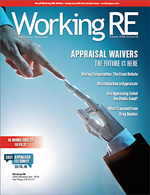 |
“One of the best courses that I have had in 17 years!” -Amy H
>> OREP E&O |
Editor’s Note: Take the NEW 2021 Appraiser Fee Survey online now at WorkingRE.com/2021survey.
What I Learned from Drug Dealers
by Richard Hagar, SRA
I’ll explain about the title in a minute.
I teach a class called Real Estate, Mortgage, and Appraisal Fraud to various departments of Homeland Security; one of the departments is the Drug Enforcement Agency (DEA). Several years ago I was teaching the class and some of the DEA agents suggested that I stick around the next day and attend their class on drug dealers and organized crime. In the class, among other things, I learned that the average drug dealer earns $35,000 per year peddling drugs from a street corner. Of course, the dealer must deal with obtaining their product, marketing and delivery, as well as guns, violence and the probability of being arrested. And on top of it all, massive competition—not the best of business models.
The DEA training officer told the audience that the street corner hustlers had amazing marketing skills. Well this focused my attention. What marketing skills could a drug dealer have?
He went on to explain that drug dealers are “nice” to potential clients to get them to “like them.” Then the dealers offer their potential clients a solution to their problems—drugs to make them feel better. Typically they furnish the first few “tastes” for free, until they are hooked.
As sad a commentary as this is, and as far out as the comparison may seem, I can’t help thinking we can learn a little something about how to market our services.
Three Steps to Higher Fees
As I teach classes I hear the same lament from appraisers all across America: “Clients in this area aren’t paying appraisers more than $350” or “I’ll provide a better appraisal when the client pays me more.” While I understand their point of view, I believe that if you want to earn higher appraisal fees, there is another way to do business. Appraisers must make themselves found, make themselves trusted and be service oriented.
Step #1: Being Found
Future clients must know you exist. I’m aghast at the number of appraisers who don’t have a website. Every appraiser needs a website and a Facebook page that explains who they are, what services they provide, and in what areas of the country they cover. If you don’t market you will be forced to work for low-paying lenders and AMCs. Many clients are desperate for good appraisers and complain that competent appraisers can’t be found. They are willing to pay more if only they could find you. I can attest that this is true. Start your move toward higher fees by making yourself better known. Stop hiding; get a website!!
Step #2: Being Trustworthy
Increase the quality of your appraisals. Provide less boilerplate and increase the relevant explanations specific to the market and subject. Take more education and learn more—the times they are a-changing. Support your adjustments and include a summary of the adjustment process in every appraisal. Be more factual and less opinionated. Stop using MLS photos. It’s best if you use photographs that you have personally taken for the appraisal assignment in question and are not reusing a photograph from an old appraisal or the MLS. Fannie Mae’s Collateral Underwriter (CU) knows when the photos are reused or MLS, so use your photos once and don’t lie to clients—it only hurts you. Clients must trust us and learn from our reports.
(story continues below)
(story continues)
Step #3: Be Service Oriented
Be more helpful and business minded—that will make your services be in demand. Not all requests from the AMC or lender are attempts to obtain higher value conclusions; sometimes they are trying to obtain a better understanding of the market and subject property. If a lender has questions, try to provide the answers on the same day…not days later—”when I have time to get back to you.” That attitude does nothing to help a client and everything to indicate your disdain for them. If you don’t like the way a client interacts with you, fire them and find ones that you can work with. In other words—increase the quality of your customer service and solve your client’s problem.
Get the client to like your product and service more than your competition. Get them to like you and forget the email address of others in your market.
In other words: if you want higher fees, you need to first get your client hooked on your drug…er… the quality of your appraisals and your service. Once they get “hooked,” that is, accustomed to quality and service, you can justifiably begin raising your fees. You will be worth it to them. This is the correct order by the way; improve quality first then raise your fees, not the other way around.
Improve your skills and product and get higher-paying clients hooked.
About the Author
Richard Hagar, SRA, is an educator, author and owner of a busy appraisal office in the state of Washington. Hagar now offers his legendary adjustments course for CE credit in over 45 states through orepeducation.org. The new 7-hour online CE course “How to Support and Prove Your Adjustments” shows appraisers proven methods for supporting adjustments. Learn how to improve the quality of your reports and defend your adjustments! OREP insureds save on this approved coursework. Sign up today at www.OREPEducation.org.
Tips for Smoother Appraising
CE Online – 7 Hours (45 states)
How to Support and Prove Your Adjustments
Presented by: Richard Hagar, SRA
Must-know business practices for all appraisers working today. Ensure proper support for your adjustments. Making defensible adjustments is the first step in becoming a “Tier One” appraiser, who earns more, enjoys the best assignments and suffers fewer snags and callbacks. Up your game, avoid time-consuming callbacks and earn approved CE today!
Sign Up Now! $119 (7 Hrs)
OREP Insured’s Price: $99
>Opt-In to Working RE Newsletters
>Shop Appraiser Insurance
>Shop Real Estate Agent
Insurance
Send your story submission/idea to the Editor:
isaac@orep.org




by Larry Fenimore
Sounds good on paper. In reality most folks don’t care if I do superior work, which I do always, because they don’t care. They just want to get them in and out at a low fee as quick as they can. If you are licensed they do not know a good appraisal from a bad appraisal sad but true. In today’s market seems it has become nearly impossible to know a good appraisal from a bad one. Due to buyers being under duress and paying auction prices.
-